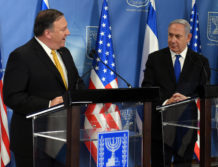The United States on Monday is resuming sanctions on key Iranian industries—including the oil and financial sectors—and their impact was already being felt before the sanctions’ effective date as global businesses anticipated the sanctions “snapback.” US Secretary of State Mike Pompeo last Friday said that ahead of the sanctions’ return on November 5, they expect to have already reduced Iranian crude oil exports by more than 1 million barrels.
“This massive reduction since May of last year is three to five times more than what many analysts were projecting when President [Donald] Trump announced our withdrawal from the [nuclear] deal back in May,” said Pompeo in comments released by the State Department. “We exceeded our expectations for one simple reason: Maximum pressure means maximum pressure.”
The Israelis were already applauding the American sanction plans last week as well. “For years, I’ve been calling for sanctions to be fully reimposed against Iran’s murderous terrorist regime, which threatens the entire world,” said Israeli Prime Minister Benjamin Netanyahu on Saturday evening in a press release. “The effect of the initial sanctions is already being felt—the [Iranian] rial [currency] has plummeted, Iran’s economy is depressed and the results are evident. Thank you, President Trump, for this historic move.”
Pompeo made it clear that the intent of the sanctions is to convince the Iranian regime to change their malevolent actions, not to harm the Iranian people. “It is aimed at depriving the regime of the revenues that it uses to spread death and destruction around the world,” said Pompeo regarding the sanctions. “Our ultimate aim is to compel Iran to permanently abandon its well-documented outlaw activities and behave as a normal country.”
According to Pompeo and US Treasury Secretary Steve Munchin, at least some elements of the sanctions are even stronger than they were before the nuclear deal with Iran suspended the restrictions. Pompeo said that an oil loophole allowed under the Barack Obama Administration that allowed “millions of dollars to continue to flow” to the Iranian regime has been closed.
And while the US is providing eight jurisdictions temporary exemptions to continue to import Iranian oil, Pompeo said that contrasted with the 20 such exemptions provided at times under the Obama Administration. “Not only did we decide to grant many fewer exemptions, but we demanded much more serious concessions from these jurisdictions before agreeing to allow them to temporarily continue to import Iranian crude oil,” said Pompeo. “These concessions are critical to ensure that we increase our maximum pressure campaign and accelerate towards zero [Iranian oil exports].”
Munchin, in the same press conference with Pompeo that was published by the State Department, said not only will hundreds of entities be placed back on the US Treasury blacklist that had been exempted under the nuclear deal, hundreds of new ones will be added. “This is substantially more than we ever have previously done,” said Mnuchin.
While the Israelis are supportive of the US sanctions on Iran, the Europeans are trying to work around the American actions. A joint statement from representatives of the European Union, Germany, France, and the UK released on Friday by the German Foreign Ministry said they were working on finding ways to maintain financial relationships with Iran and continue Iranian oil and gas imports to Europe.
“This will enable continued sanctions lifting to reach Iran and allow for European exporters and importers to pursue legitimate trade,” said the statement.
While Mnuchin did not expect any transactions done through the main European workaround to be significant, he noted, “If there are transactions that go through there that have the intent of evading our sanctions, we will aggressively pursue our remedies.”
(By Joshua Spurlock, www.themideastupdate.com, November 4, 2018)

